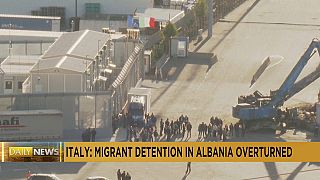Italy
This year's Britain’s national pavilion at the Venice Biennale began with video from the Tudor court that remembers the death of a British-Nigerian man, David Oluwale, who drowned in a Yorkshire river after being beaten by local police in 1969.
Along the way, in the Ghanaian film-maker Sir John Akomfrah’s exhibition, comes a sumptuously told visual and auditory story.
"It's a project on memory and water functions for me as a very resonant image of memory. How it works, where it goes, and the form that it takes in our lives." says****John Akomfrah.
The Ghanaian founder of Black Audio Film Collective said he would have laughed if someone had said he’d someday be in the pavilion
John Akomfrah, artist, British pavilion: "I mean, this feels like a very significant moment for artists of color. Because I'm in the British pavilion. Next to me is a French one that's with an artist, Julien, who I love a lot, of African origin. And then next to me is a Canadian pavilion that has a biracial artist, again of African heritage. So that's certainly not happened before, that three major pavilions have artists of color, inhabiting, occupied, making work in them. And that feels like a breakthrough."
There are 88 national pavilions in the city’s public gardens featured in this year's Venice Biennale, the world’s largest and most prominent art event . Benin, Ethiopia, Tanzania, Senegal, Timor-Leste and Panama are taking part for the first time.
Commissioned for the Venice Biennale by the British Council, sections of Akomfrah’s work will also be shown in the UK in 2025 at the National Museum of Wales, and at Dundee Contemporary Arts.












02:20
Abuja festival focuses on African culture in the digital age
02:19
Germany exhibition aims to broaden understanding of Africa through art
01:00
Watch: Robot artist Ai-Da makes history with $1.32 Million sale
02:19
15th edition of Biennale of contemporary African art opens in Dakar
02:20
Ancient meets modern: contemporary art show opens at Giza Pyramids
02:19
Burkinabe playwright aims to break the silence about rape